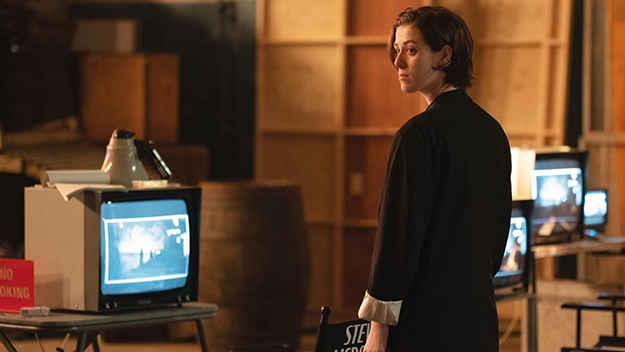Cannes 2021: The First Days
This article appeared in the July 9 edition of The Film Comment Letter, our free weekly newsletter featuring original film criticism and writing. Sign up for the Letter here.

The Souvenir Part II (Joanna Hogg, 2021)
This will certainly be remembered as the Cannes that had the critics salivating. Not so much because of the program, that is—though it’s mouth-watering enough on its own terms—but because of the COVID-19 regulations that require PCR tests every 48 hours for visitors from countries on France’s amber list. It’s not so onerous reporting to a marquee and dribbling into a tube, but having to book appointments ahead and shoehorn them into a full screening schedule added an extra challenge to the first COVID-era Cannes to happen live, with things already more difficult than usual.
A new ticketing system designed to make the festival safer means that everyone has to book films, including press screenings, up to two days in advance, although an e-ticket which advises you to arrive at a particular time—no earlier, no later—doesn’t prevent you from having to wait in long queues under a punitive July sun. The queues have made the festival seem more crowded than usual—altogether paradoxically, since many places you normally pass through daily, like the Palais corridors, or the lobbies of hotels like the Majestic, are often eerily empty.
It didn’t help that the new online ticketing system crashed on Day 2 of the fest. The system also meant a Cannes without spontaneity: gone are the moments when you could dive into a screening on a whim because someone just recommended the film to you. Gone, too, is the possibility of sitting with friends and colleagues, when you’re directed to sit in a particular row—something that’s bound to have an effect on festival debate and that elusive quantity, “buzz.”
Fortunately, it looks at time of writing (Day 3) as if our nerves will be soothed by a strong program. This year’s opening film divided audiences, but everyone could agree at least that it constituted an event. Annette, by Leos Carax, French cinema’s ultimate Monsieur Seldom-Seen, was a grand folly of a musical narrative co-written with, and featuring songs by, revered U.S. pop duo Sparks. Disappointingly, these usually exuberant eccentrics were on oddly flat, solemn form in a joyless exercise that felt less like the Gesamtkunstwerk that Carax was presumably aiming for than a simple rock opera (to use an archaic term), and one with marginally less narrative complexity than Ken Russell’s Tommy (1975). It didn’t bring out the best in either Marion Cotillard or a morose, stormy-browed Adam Driver—although the overture number “So May We Start” was a buoyant saving grace.
A far more persuasive opener screened a few hours before Annette: Mark Cousins’s The Story of Film: A New Generation, which updates his encyclopedic TV series. His new chapters simply propose that this century, cinema has seen as many artists expanding or breaking rules as it ever has: beginning with the odd juxtaposition of Joker and Frozen, via Apichatpong Weerasethakul, Claire Denis, Tsai Ming-Liang’s VR, the Spider-Verse, and all points beyond, it was a free-associative expression of faith in the continuing validity of the very thing that brought us to Cannes.
That cinema can still be, as they say, as important as life, was also the message of Joanna Hogg’s The Souvenir Part II, continuing her 2019 semi-autobiographical drama about pain, passion, and the problems of becoming a filmmaker when you’re posh and a young woman. This time, heroine Julie (played with a nervily crackling blend of alertness and fragility by Honor Swinton Byrne) pursues her directing career while coming to terms with the death of her difficult boyfriend at the end of Part One. The film ends with an extraordinary, rhapsodic fantasy sequence in which—to read it one way—Julie processes her experience through a dream fugue of cinema images. It’s a total departure from anything this director has attempted before, yet a perfect ending (perhaps the only possible ending) to this superb diptych.
The French cinema on show has so far brought us some things that proved that it could do business as usual, in a confident way. There was writer Emmanuel Carrère’s drama Between Two Worlds, with Juliette Binoche launching a very Loachian investigation into unemployment in Northern France, and François Ozon’s Everything Went Fine, based on Emmanuèle Bernheim’s book about her father’s choice of assisted suicide. It dealt subtly and intelligently with questions of life, death, and ethics, and while lead Sophie Marceau didn’t quite have the range of nuance that the Bernheim role called for, veteran great André Dussollier was masterly as a man exerting his will despite a debilitating stroke. But the film felt slightly… if not academic, then well-behaved, even studious, which is not Ozon’s natural mode.
One new French director, though, really stretched his neck. Arthur Harari’s second feature Onoda was a drama in Japanese about Hiroo Onoda, the Japanese soldier who famously held out after the end of World War II, refusing to believe that the conflict was over, and hiding out on an island in the Philippines on a guerrilla mission that he carried on until the mid-’70s. There’s something magnificent and crazy about the film, which matches Onoda’s madness with its own single-minded quixotic aspiration to the epic. With Yūya Endō and Kanji Tsuda compelling, and not a little unsettling, as Onoda young and old, the film captures war as derangement, and heroism as delusion, to troubling and even moving effect. There’s an extraordinary, Herzogian film in Onoda somewhere, and if Harari had only managed to rein in its 166-minute length, we’d have had a proper chance to see it. We might yet.
Jonathan Romney is a critic based in London. He writes for the Observer, Sight & Sound, Screen Daily, and others, and teaches at the National Film and Television School.







